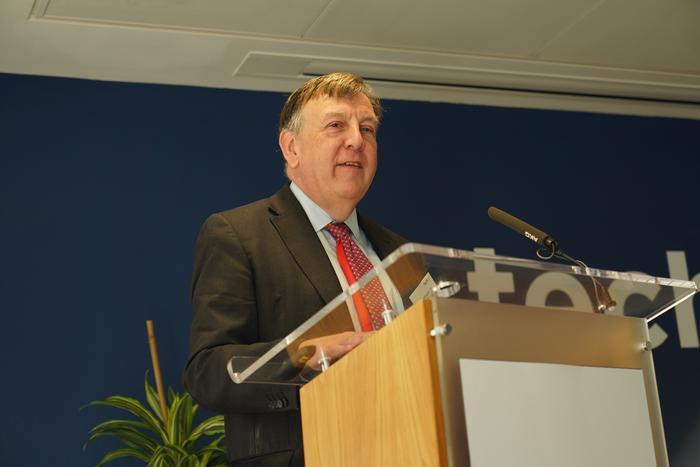Event recap: International Telecoms Conference, in partnership with DSIT
On Monday 12 June, techUK hosted the first ever International Telecoms Conference. The full day summit was organised in partnership with the Department for Science, Innovation and Technology (DSIT). The day began with a keynote by the Minister of State for Data and Digital Infrastructure, the Rt. Hon. Sir John Whittingdale MP.
The Minister outlined how the UK has been working with like-minded partners to promote telecoms security and supply-chain diversification internationally. The Minister announced several developments: a Memorandum of Understanding between the United Kingdom and Australia regarding telecom supply-chain diversification; a Smart Infrastructure Pilots Programme to support Local Authority-led pilots with smart service providers; and the next stage of the UK’s Alpha Trial programme on the island of Papa Stour in Shetland. The Minister concluded that the Government was taking an ambitious approach to telecoms policy to keep the UK at the forefront of the international telecoms ecosystem and to ensure all in the UK are able to enjoy high-quality connectivity.

Telecoms: The Big Questions
Moderated by Deputy Director for Telecoms Diversification at DSIT Francesca Lamarque, Ros Singleton (Chair of the Telecoms Supply Chain Advisory Council) and techUK’s Matt Evans tackled the big questions facing the sector in the opening panel discussion. One of the most significant and pressing challenges for the international community is network security, both in terms of protecting networks themselves and in ensuring diverse supply-chains keep the UK’s telecoms sector resilient. In addition to these, there are significant challenges is the increasing diversity of connectivity options. There has been both a diversification in providers of connectivity, especially with AltNet providers, as well as network technologies, with the growing importance of Open RAN, software-based providers and private network providers. This proliferation has caused growth in the sector but makes the telecoms ecosystem harder to grasp, especially in the international sphere.
In order to grasp these challenges, the panel outlined several areas where the UK Government could take greater action. These included the promotion of skills through apprenticeships, returnerships, lifelong learning and degree qualification, with one suggestion of a ‘telecoms masters’ on the model of the AI masters degree. Government procurement was also cited as being a way to support the UK’s most innovative SMEs, along the lines of DARPA in the United States, and to plug the 5G investment gap. The UK Government also needs to ensure that it is not just protecting and fully utilising physical connectivity infrastructure, but invisible infrastructure such as radio spectrum.
The panel also agreed on the importance of intermediary organisations that can ‘gear-up’ action in both Government and telecoms firms, to ensure that the UK is remaining dynamic. The panel concluded that if the UK Government can work with the increasingly complex telecoms ecosystem to foster innovation, ensure a sufficient pipeline of high-class talent, and place the UK on a sure footing in terms of international standards, then the UK is poised to take full advantage of the opportunities offered by future telecoms.
Further highlights of the conference can be viewed below:
Future Telecoms: The UK Approach
Discussions revolved around the Department for Science, Innovation and Technology’s two reports covering Supply Chain Diversification, and Wireless Infrastructure Strategy – which includes the Government’s approach to helping develop 6G.
As the UK increases its 5G adoption, the Government continues to develop links between industry and academia around required priorities areas towards 6G innovation, including; resolving investment blockages within satellite infrastructure, facilitating the Open Networks Programme’s £250 million funding, and adopting a new systems utilising cloud.
The session also included representatives from specific Communication Hubs and Platforms, covering various technical specifications within Communications systems, layers, and quantum computing. Discussions developed around the representatives’ experiences and insight into the UK’s Future Networks project, developing ideas around a telecommunications vs specialised technologies strategic focus, Networks of Networks, and collating hardware and software mechanisms.
Non-terrestrial Telecoms Platforms
There was an overwhelming consensus among panellists that satellite and other non-terrestrial platforms will play a pivotal role in future telecommunications infrastructure. The combination of connectivity, resilience, global coverage, and compatibility with emerging technologies, such as 5G/6G positions them as vital components of the future of communications, as it was evidenced in OneWeb & Clarus Networks’ trial to connect remote communities in the Shetlands.
The panel emphasised the paramount importance of integrating terrestrial and non-terrestrial networks to effectively deliver the capabilities of 5G and future generations, such as 6G. A seamless integration and convergence will enable numerous use cases (broadband, IoT, mobility, M2M etc.), increase accessibility to technologies, reduce costs and facilitate the introduction of new services such as direct-to-handset communication.
Compete to Innovate: Achieving Policy Objectives through Government R&D Competitions
Government competition frameworks have proven to be effective tools for achieving policy objectives by fostering innovation, taking risks, and engaging a wide range of stakeholders, including academia, industry, startups, and other stakeholders.
Speakers noted that by leveraging a wide range of expertise and promoting outcome-driven solutions, R&D competitions can indeed accelerate time-to-market for innovations and contribute to building vibrant telecoms ecosystems. However, challenges remain when it comes to commercialisation and fully transitioning into the market can be complex.
Industrial Adoption of 5G
The discussion covered the UK Telecoms Innovation Network (UKTIN), comparisons with Japan’s industrial adoption strategy, towards points of maturity, and the lack of a business case for low-latency investment.
Panel members also developed ideas around the key challenge of scale, of which large operators sharing networks has led to complex integration blockages. However, the segmented nature of its markets, has acted as an important catalyst for maturing the market’ innovative solutions, including within MVNONs (Mobile Virtual Network Operator Networks), GCF (Global Certification Forum) certifications and a move towards ‘Out of the Box’ switch-on.Championing Security, Resilience and Openness Through Telecoms Standards
The panel addressed the main themes and priorities for 5G standardisation and what can be learnt for 6G. Common areas were clear expectation management of method and timeline and focusing on diverse performance metrics such as societal value and sustainability, as well as the more classic speed focus.
Other areas of interest included expectations of focus for 6G and resilience (including materials/value chain resilience), sustainability, energy efficiency and security.
When considering increasing diversity in standardisation input to ensure openness through standards, key points were organisations having lower member fees for SME’s, increased online/hybrid meeting options, available funds (such as travel funds) and including wider input such as societal stakeholders. A strategy shift for investors funding research to consider standardisation as a natural progression of the process was suggested, as well as government encouraging/facilitating global collaboration in coordination with other activities, such as sponsoring SME’s.
Spectrum: Maximising Efficiency and Availability
Proliferation of new services and devices, advancements in technologies, and the increasing reliance on wireless services have become significant drivers of spectrum demand – which ultimately highlights the need for regulators and governments to continually assess spectrum allocations, explore new frequency bands and implement efficient spectrum management strategies to meet the evolving demands of these services and technologies.
Spectrum sharing, particularly dynamic allocations of usage, is poised to play a poised to play an even more significant role in the future of spectrum policy. Panellists discussed the need to create options to choose technological outcomes in order to address the growing demand for wireless services and optimise the use of this finite resource.
Open RAN: From the Lab to the Field
The panel addressed questions such as “why is now the right time for open RAN”, as well as the associated challenges. Key points included that it is faster to deploy, allows for a cheaper, improved system for consumers as well as being future proof and delivering choice and flexibility to service providers.
Identified challenges included a need to think differently both in a network and organisational capacity. Hardware and labour intensity requiring a new software focus which includes increased use of cloud/AI, and laying the correct foundations for a software/automation focus shift. Also discussed was what government is doing to incentivise Open RAN rollout and creating a fruitful environment for commercial success.
Comments included that Government incentivisation is overdue in telecoms but, now that it has begun, momentum must be maintained whilst avoiding a nationalistic focus and ensuring a global ally system which allows for open movement and the support of faster evolution. When considering key comments on creating a commercially successful environment, these included breaking down barriers, bringing operators to work together, activities such as the DSIT Open Networks competition programme and government incentivisation including additional time as well as funding.
Looking Ahead: the Vision for 6G
The session began with a presentation on the UK Government’s 6G strategy by Professor Simon Saunders, before a panel discussion.
The panel outlined their visions for making a success of 6G, with openness, security, resilience, flexibility and sustainability the most important ideas. Government speakers outlined the importance of communication with the private sector to not just be educated on the telecoms sector, but to act as a partner in facilitating companies through procurement and keeping the space open for new entrants. Similarly, it was agreed government had a key role to play in the creation of common international standards to build an open, secure, resilient, flexible and sustainable 6G.
Panellists also discussed the UK as a future telecoms research market. Generally, the UK’s greatest strength is the high-quality talent pool available to researchers. These can be found not just in the universities, but through those who have been employed in the telecoms sector for 40 years, since the pioneering of 1G in the 1980s, with UK expertise therefore covering the entire telecoms supply chain. This strength of talent though is undermined by Government support schemes which are orientated towards domestic SMEs and not multinationals, who may be offered generous subsidies to relocate elsewhere.
The panellists agreed that new technologies would have a critical impact on 6G. These technologies will affect both the management of the networks and the use cases that will encourage 6G expansion. AI was cited as playing a key role on both sides of the coin, both through managing networks to improve energy efficiency and being carried over networks for other uses. These new use cases though will require 6G to have those qualities, such as security, that allow consumers to fully utilise the advantages conferred by 6G.
Thanks to all of our delegates and speakers for making the inaugural International Telecoms Conference such a success.
Exploring the Potential of Future Telecoms
Visit our Future Telecoms Hub to learn more or to register for regular updates.
Future Telecoms is techUK’s exploration of what the connectivity of tomorrow will look like. We will highlight the criticality of communications to our future prosperity and economic growth, and how the future telecoms ecosystem acts as the engine of innovation. Visit our Future Telecoms Hub to learn more or to register for regular updates.
Upcoming Future Telecoms events
Latest news and insights
Communications Infrastructure and Services updates
Sign-up to get the latest updates and opportunities from our Communications Infrastructure and Services programme.
Contact the team
Learn more about our Future Telecoms campaign











